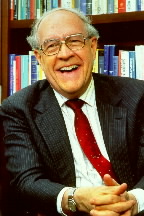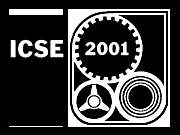Symposia
Monday, May 14, 2001
A1
Doctoral Symposium
Symposium chair:
Mary Lou Soffa,
University of Pittsburgh, USA
Contact:
Mary Lou Soffa
soffa@cs.pitt.edu
The Doctoral Symposium is a forum for graduate students to present and discuss their dissertation research objectives, approaches, and preliminary results. The workshop aims to broaden the perspectives and improve the research skills of new entrants to the software engineering community. Students receive guidance and feedback on various aspects of their research from established researchers and the other graduate student attendees. The workshop is intended for students who have a specific research proposal and some preliminary results, but with sufficient time prior to thesis completion to benefit from the workshop experience. A summary of the workshop program and contributions will appear in the conference proceedings.
Attendance is by prior application and invitation.
Monday, May 14, 2001; 8:30 a.m.–5:30 p.m.
Tuesday, May 15, 2001
A2
David L. Parnas Symposium (DLPS)
Symposium chairs:
Dan Hoffman,
University of Victoria, Canada; and
David M. Weiss,
Avaya Communication, USA
Contact:
Dan Hoffman
dhoffman@csr.uvic.ca
DLPS Web Site
David L. Parnas is one of the grandmasters of software engineering. His academic research and industrial collaborations have exerted far-reaching influence on software design and development. His groundbreaking writings capture the essence of the innovations, controversies, challenges, and solutions of the software industry. Together, they constitute the foundation for modern software theory and practice.
This symposium is being held in Recognition of Parnas's work and in honour of his 60th birthday. It is an opportunity for everyone in the software engineering community to celebrate his contributions, and to think hard about where we are today and where we are going.
The symposium program consists of talks by leading software engineering experts, including keynotes by Fred Brooks and Jon Bentley, a short presentation by Parnas, and a panel on software engineering education.
Each symposium attendee will receive a copy of the book "Software Fundamentals: Collected Papers by David L. Parnas" a new book from Addison-Wesley.
Tuesday, May 15, 2001; 8:30 a.m.–5:30 p.m.
Closing for David L. Parnas Symposium
(Open to all ICSE attendees)
The talk and personal retrospective in this session concludes the David L. Parnas Symposium, but is open to all ICSE conference attendees. A reception follows.
Software Fundamentals: The Ideas of David L. Parnas
David M. Weiss,
Avaya Communication, USA
At ICSE 2001 we are honoring the work of one of the grandmasters of our field, highlighting the fundamental ideas that David L. Parnas invented and expounded, including such ideas as information hiding, abstract interfaces, the uses relation, program families, explicit layered exception handling, and deterministic scheduling for hard real-time systems.
Do you need to understand how to organize your software into modules so that it can be easily maintained and your modules are reusable, whether they are expressed as classes, packages, or other forms? Dave Parnas identified the information hiding principle and showed how to use it to construct workable, reusable modular structures that are stable over time.
Are you struggling to create APIs to make your software useful to application programmers? Dave Parnas devised the idea (and coined the term) for abstract interfaces, and showed how to design interfaces that provided services without revealing their implementations. Languages like C++ and Java directly support this idea with abstract classes.
Are you wondering how to create your software as a set of layers that define a hierarchical structure that meets your requirements, lets you build your system a few layers at a time, and lets others add to the structure that you have created? Dave Parnas clearly explained what a hierarchical structure is, what some of the important hierarchical structures that we use are, why people often confuse them, and how to create a layered structure that meets your needs.
Do you know that your software is going to exist in many different versions, but are having difficulty designing your software not just to accommodate the different versions, but to take advantage of your situation to make your development process more efficient? Dave Parnas defined program families to help with just this situation and showed how to create them in a cost-effective way.
However, Dave has been busy in more than just technical areas. His work includes commentary on the social responsibility of software engineers, both by exposition and by example, and on how we should educate our students so that software development becomes an engineering profession. His stance on our inability to create trustworthy software for the Strategic Defense Initiative, as well as his thoughts on how to teach software engineering have influenced how we think, act, and teach, as well as how the public perceives us.
David Parnas is both a clear and creative thinker and an extraordinary expositor of seminal ideas. The issues that he addresses are at the heart of software engineering today; his explanations are still relevant and his solutions, trialed on real systems, transfer well to today's software development organizations and environments.
Biography
David M. Weiss is Director of Software Technology Research at Avaya Laboratories, where he conducts and guides research into ways of improving the effectiveness of software development. Formerly he was Director of Software Production Research at Bell Laboratories. He has also served as CTO of PaceLine Technologies and as Director of Reuse and Measurement at the Software Productivity Consortium. At the Congressional Office of Technology Assessment he was co-author of an assessment of the Strategic Defense Initiative, and he was a visiting scholar at The Wang Institute. He originated the GQM approach to software measurement as his PhD thesis at the University of Maryland, was a member of the A-7 project at the Naval Research Laboratory, and devised the FAST process for product-line engineering. He has also worked as a programmer and a mathematician.
"Diogenes, Where Are You?"
Frederick P. Brooks, Jr.
University of North Carolina, Chapel Hill, USA
What kind of person do we honor today?
Fearlessly honest; honestly fearless.
Dave is brilliant; many people are brilliant. Dave is impressively productive; many are productive. Dave is articulate and lucid; many are articulate, some are lucid.
As much as we admire that profound, tough, clean mind, it is the attributes of character that we admire more. I submit that it is Dave's character attributes, as much as his mind, that have produced this incredible body of work.
First his honesty. Dave is ready to question his own assumptions, ready to accept such critique by others, and ready to let the chips fall where they may as the logical consequences of assumptions emerge. "Our first duty in research is to the truth."
Second, his principled approach to every task. He has technical principles, which he articulates, which he follows in his research, and which he tests and demonstrates in practice. His principles of professional ethics he has clearly enunciated and consistently followed. His social conscience, his professional conscience, and his personal conscience are all keen.
Third, his boldness. He likes to question assumptions, to challenge widely held beliefs and attitudes. He is not shy about criticizing, even satirizing, work he considers shoddy. He freely states opinions, as such, that cannot yet be supported by data, but which he bases on experience and judgment. "I am not a modest man."
Fourth, his commitment. Mili has put it well: Dave has not looked for quick or superficial contributions, but has made a "long-term, focused, painstaking effort." Each of those four words is crucial for his contributions.
An honest sketch of an honest man must remark that any one virtue--even honesty--fully embraced, makes some other virtues difficult.

Frederick P. Brooks, Jr.
ACM Turing Award Recipient
University of North Carolina, Chapel Hill, USA
http://www.cs.unc.edu/~brooks/
Biography
Frederick P. Brooks, Jr., is Kenan Professor of Computer Science at the University of North Carolina at Chapel Hill. He was an architect of the IBM Stretch and Harvest computers. He was corporate project Manager for the System/360, including development of the System/360 computer family hardware, and the Operating System/360 software. He founded the Department of Computer Science, University of North Carolina, in 1964 and chaired it for 20 years.
His research includes computer architecture, software engineering, and interactive 3-D computer graphics (virtual reality). His best-known books are The Mythical Man-Month: Essays on Software Engineering, and Computer Architecture: Concepts and Evolution (with G.A. Blaauw, 1997). Dr. Brooks has received the National Medal of Technology, the Bower Award and Prize of the Franklin Institute, the John von Neumann Medal of the IEEE, and the Allen Newell and Distinguished service awards of the ACM.
Tuesday, May 15, 2001; 5:45 p.m.–7:00 p.m.
A3
New Software Engineering Faculty Symposium
(Morning Only)
Symposium chairs:
Leon J. Osterweil,
University of Massachusetts, Amherst, USA;
Gabriel Silberman,
Centre for Advanced Studies, Canada; and
Kenny Wong,
University of Alberta, Canada
Contact:
Kenny Wong
New software engineering faculty face many challenges in this ever-changing world of software. They are typically under tremendous pressure to teach courses for new software engineering programs, supervise many graduate students, collaborate with industry, raise research funds, be leaders in their field, and publish journal papers. While trying to obtain tenure, they are also enticed by the high salaries of those who have chosen to work in industry.
There is a tremendous shortage of software engineering faculty in many countries around the world. The ICSE community is committed to help new software engineering faculty survive in academia. This symposium grew out of the need to support and encourage new software engineering faculty in their early careers.
This morning symposium will bring together faculty who have survived their early years with new and junior faculty. The main goal is to share and exchange ideas on practical methods for having a successful and fulfilling academic career. The attendees can work together on strategies for success and shop from the best ideas and experiences of their colleagues.
Tuesday, May 15, 2001; 8:30 a.m.–12:00 p.m.

